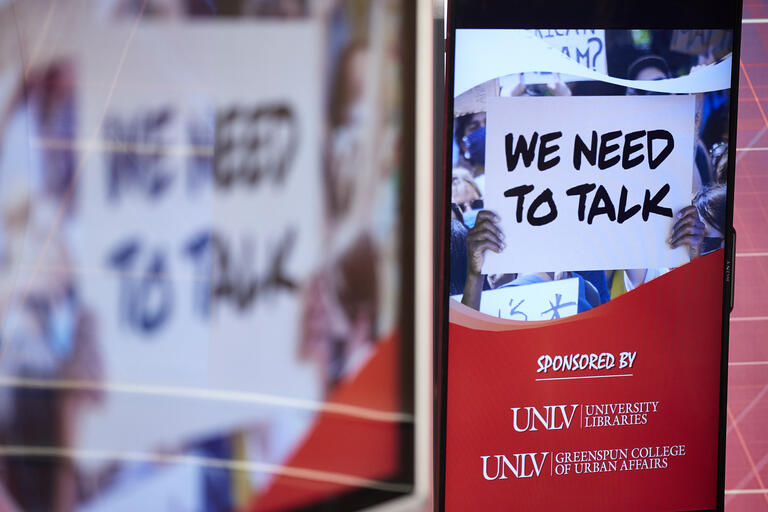At the start of the COVID-19 crisis in early 2020, Assistant Professor Brian Labus and the School of Public Health put together a team of student contact tracers to help stop the spread of the emerging pandemic. A little over a year later, with cases now decreasing in Southern Nevada and nationwide, Labus and his team look back at how they overcame challenges while standing at the forefront of the community’s public health response.
With $5.1 million in grant funding from the State of Nevada, the School of Public Health was presented with an opportunity to partner with the Southern Nevada Health District and employ university students to assist in reaching out to individuals who may have been exposed to COVID-19.
What started out as a volunteer team of only a handful of students led by Labus eventually expanded to nearly 240 paid contact tracers who spoke 29 different languages. These students were all trained and led by a group of 15 experienced UNLV graduate students.
Since the contact tracing efforts began in the spring of 2020, the team has investigated over 38,000 cases, accounting for 1 in 6 COVID-19 cases investigated in Southern Nevada.
“Contact tracing is a vital part of monitoring and controlling the spread of infectious diseases,” said Labus.
If individuals test positive for COVID-19, they are interviewed and asked to identify others they may have been in close contact with. Contact tracers also ask these individuals about symptoms experienced, providing guidance and advice on testing and quarantine protocols.
“During our calls, we ask how they are doing, provide isolation instructions, and obtain information about close contacts, recent places they’ve visited, and more,” said Casey Barber, public health Ph.D. student and contact tracing team manager. “Contact tracers also help to answer questions and connect individuals to community resources like the Nevada Resilience Project’s Resilience Ambassadors.”
More than 1,100 students initially answered the call to become a contact tracer. Once selected, those hired underwent comprehensive training, which included learning the contact tracing system and spending time making calls under supervision at UNLV.
If building a large team from scratch, developing policies and procedures, and quickly recruiting hundreds of students weren’t challenging enough, operating remotely and motivating a new team during a pandemic created additional hurdles.
“We learned how to communicate and train hundreds of people all while being remote,” said contact tracing team manager and public health master’s student Brianna Rivera. “We were able to combat these challenges, all thanks to Google Meets.”
“We had to get creative with ways to engage our team members and build relationships with them,” added Barber. “We set up weekly virtual meetings, and we also created a weekly team email to share positive messages, shout-outs, and thank yous to each other.”
Building trust with the public and communicating information effectively was key as explained by team manager Kristina Mihajlovski, also a master’s student at the School of Public Health. “When the pandemic started, people were afraid. We had to overcome this obstacle by reassuring people, providing them with evidence-based information, using plain language and showing empathy.”
Through this work, UNLV students applied what they learned in the classroom and were able to gain real world experience, which was especially crucial as jobs and internships had become difficult to find during the pandemic.
For Mihajlovski, being at the forefront of the public health response and potentially saving lives was a once-in-a-lifetime opportunity. “Learning how to be prepared to act promptly during the pandemic and always be ready to modify a plan of action and intervention was an incredible learning process. I feel ready to help the community in any future public health emergency.”
The experience gained as part of the team has proven to be invaluable as a number of students have already moved onto full-time positions with various public health agencies.
“The problems we face won’t go away when this pandemic is over, and we will need a skilled public health workforce to continue to protect our community,” said Labus. “By giving our students this experience, we can help Nevada for years to come.”
Like Barber and Mihajlovski, Rivera joined the team as a volunteer at the start of the program. She says that joining this effort was the best decision she ever made. “There is no way I would have gained this much experience and knowledge so early in my career if it weren’t for the contact tracing team.”
UNLV will continue to work with a small team of contact tracers as it wraps up its activities for the health district this summer. While the need for a large contact tracing team has decreased, the impact is significant for the team as cases of COVID-19 have also dropped.
“Every time we asked someone to isolate or quarantine, we potentially stopped a lot of disease from happening, and we did that tens of thousands of times,” said Labus. “There’s no way to know how many cases we prevented, but we absolutely stopped people from getting sick and dying in Southern Nevada.”
For Barber, knowing this has reaffirmed her commitment to a career in public health. “This is the most meaningful work I have ever done.”


